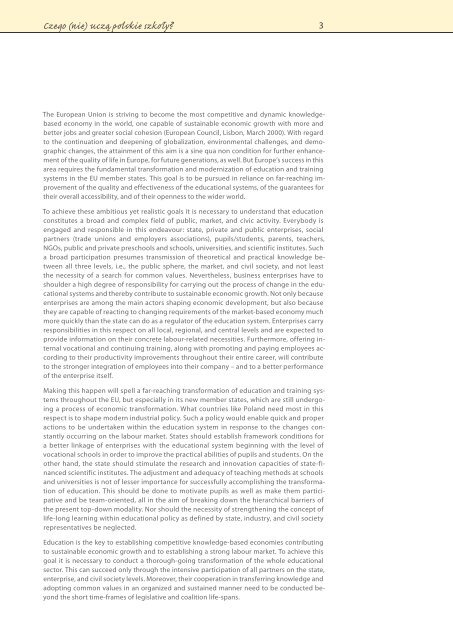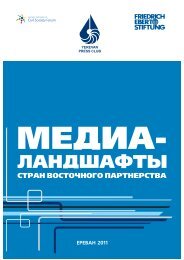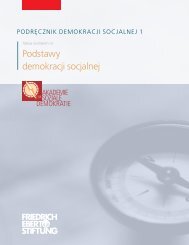Czego (nie) uczÄ polskie szkoÅy? - Fundacja im. Friedricha Eberta
Czego (nie) uczÄ polskie szkoÅy? - Fundacja im. Friedricha Eberta
Czego (nie) uczÄ polskie szkoÅy? - Fundacja im. Friedricha Eberta
- No tags were found...
You also want an ePaper? Increase the reach of your titles
YUMPU automatically turns print PDFs into web optimized ePapers that Google loves.
<strong>Czego</strong> (<strong>nie</strong>) uczą <strong>polskie</strong> szkoły?The European Union is striving to become the most competitive and dynamic knowledgebasedeconomy in the world, one capable of sustainable economic growth with more andbetter jobs and greater social cohesion (European Council, Lisbon, March 2000). With regardto the continuation and deepening of globalization, environmental challenges, and demographicchanges, the attainment of this a<strong>im</strong> is a sine qua non condition for further enhancementof the quality of life in Europe, for future generations, as well. But Europe’s success in thisarea requires the fundamental transformation and modernization of education and trainingsystems in the EU member states. This goal is to be pursued in reliance on far-reaching <strong>im</strong>provementof the quality and effectiveness of the educational systems, of the guarantees fortheir overall accessibility, and of their openness to the wider world.To achieve these ambitious yet realistic goals it is necessary to understand that educationconstitutes a broad and complex field of public, market, and civic activity. Everybody isengaged and responsible in this endeavour: state, private and public enterprises, socialpartners (trade unions and employers associations), pupils/students, parents, teachers,NGOs, public and private preschools and schools, universities, and scientific institutes. Sucha broad participation presumes transmission of theoretical and practical knowledge betweenall three levels, i.e., the public sphere, the market, and civil society, and not leastthe necessity of a search for common values. Nevertheless, business enterprises have toshoulder a high degree of responsibility for carrying out the process of change in the educationalsystems and thereby contribute to sustainable economic growth. Not only becauseenterprises are among the main actors shaping economic development, but also becausethey are capable of reacting to changing requirements of the market-based economy muchmore quickly than the state can do as a regulator of the education system. Enterprises carryresponsibilities in this respect on all local, regional, and central levels and are expected toprovide information on their concrete labour-related necessities. Furthermore, offering internalvocational and continuing training, along with promoting and paying employees accordingto their productivity <strong>im</strong>provements throughout their entire career, will contributeto the stronger integration of employees into their company – and to a better performanceof the enterprise itself.Making this happen will spell a far-reaching transformation of education and training systemsthroughout the EU, but especially in its new member states, which are still undergoinga process of economic transformation. What countries like Poland need most in thisrespect is to shape modern industrial policy. Such a policy would enable quick and properactions to be undertaken within the education system in response to the changes constantlyoccurring on the labour market. States should establish framework conditions fora better linkage of enterprises with the educational system beginning with the level ofvocational schools in order to <strong>im</strong>prove the practical abilities of pupils and students. On theother hand, the state should st<strong>im</strong>ulate the research and innovation capacities of state-financedscientific institutes. The adjustment and adequacy of teaching methods at schoolsand universities is not of lesser <strong>im</strong>portance for successfully accomplishing the transformationof education. This should be done to motivate pupils as well as make them participativeand be team-oriented, all in the a<strong>im</strong> of breaking down the hierarchical barriers ofthe present top-down modality. Nor should the necessity of strengthening the concept oflife-long learning within educational policy as defined by state, industry, and civil societyrepresentatives be neglected.Education is the key to establishing competitive knowledge-based economies contributingto sustainable economic growth and to establishing a strong labour market. To achieve thisgoal it is necessary to conduct a thorough-going transformation of the whole educationalsector. This can succeed only through the intensive participation of all partners on the state,enterprise, and civil society levels. Moreover, their cooperation in transferring knowledge andadopting common values in an organized and sustained manner need to be conducted beyondthe short t<strong>im</strong>e-frames of legislative and coalition life-spans.








